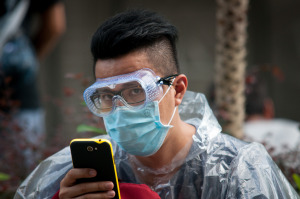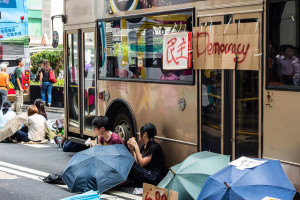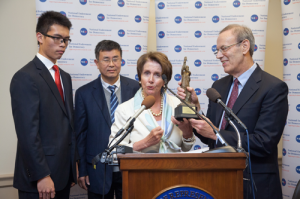
Protesters of the “Occupy Central” movement in Hong Kong shout familiar slogans and adopt familiar tactics seen across the globe as part of the United States’ immense political destabilization and regime change enterprise. Identifying the leaders, following the money, and examining Western coverage of these events reveal with certainty that yet again, Washington and Wall Street are busy at work to make China’s island of Hong Kong as difficult to govern for Beijing as possible.
Naming Names: Who is Behind “Occupy Central?”
Several names are repeatedly mentioned amid coverage of what is being called “Occupy Central,” the latest in a long line of US-engineered color revolutions, and part of America’s vast, ambitious global geopolitical reordering which started in earnest in 2011 under the guise of the so-called “Arab Spring.”
Benny Tai, a lecturer of law at the University of Hong Kong, is cited by various sources across the Western media as the primary organizer – however there are many “co-organizers” mentioned alongside him. The South China Morning Post in an article titled, “Occupy Central is on: Benny Tai rides wave of student protest to launch movement (1),” mentions most of them (emphasis added):
Political heavyweights including Civic Party chairwoman Audrey Eu Yuet-mee, former head of the Catholic diocese Cardinal Jospeh Zen Zi-kiun and Democratic Party founding chairman Martin Lee Chu-ming addressed the crowd.
The Post also mentions (emphasis added):
Jimmy Lai Chi-Ying, the embattled boss of Next Media who is under investigation by the Independent Commission Against Corruption over donations to pan-democrat politicians, said he arrived immediately after a call from Martin Lee Chu-ming.
Benny Tai regularly attends US State Department, National Endowment for Democracy (NED) and its subsidiary the National Democratic Institute (NDI) funded and/or organized forums. Just this month, he spoke at a Design Democracy Hong Kong (NDI-funded) conference on political reform. He is also active at the University of Hong Kong’s Centre for Comparative and Public Law (CCPL) – also funded by NDI. CCPL’s 2013-2014 annual report lists Benny Tai as attending at least 3 of the center’s functions, as well as heading one of the center’s projects.
Martin Lee, Jimmy Lai, and Joseph Zen are all confirmed as both leaders of the “Occupy Central” movement and collaborators with the US State Department. Martin Lee, founding chairman of the Democratic Party in Hong Kong, would even travel to the United States this year to conspire directly with NED as well as with politicians in Washington. Earlier this year, Lee would even take to the stage of NED’s event “Why Democracy in Hong Kong Matters.” Joining him at the NED-organized event was Anson Chan, another prominent figure currently supporting the ongoing unrest in Hong Kong’s streets.
Media mogul Jimmy Lai was reported to have met with Neo-Con and former president of the World Bank, Paul Wolfowitz in June 2014. China Daily would report in an article titled, “Office opposes foreign interference in HK,” that:
A special edition of Eastweek showed Lai, owner of Next Media and Apple Daily, meeting Paul Wolfowitz, a former US deputy secretary of defense in George W. Bush’s administration. The pair met on Lai’s private yacht for five hours in late May.
Wolfowitz, who was also president of the World Bank between 2005 and 2007, is well-known in the US for his neo-conservative views and belief in a unilateral foreign policy. Wolfowitz also held the post of under secretary of defense between 1989 and 1993. He is currently a visiting scholar at the American Enterprise Institute.
Lai would also seek Wolfowitz’ help in securing various business deals in Myanmar. The South China Morning Post in their article, “Jimmy Lai paid Paul Wolfowitz US$75,000 for help in Myanmar,” reported that:
Leaked documents show Apple Daily founder Jimmy Lai Chee-ying paid former US deputy defence secretary Paul Wolfowitz US$75,000 for his help with projects in Myanmar.
According to a July 22, 2013, remittance notice by the Shanghai Commercial and Savings Bank, Wolfowitz received the money from Lai as “compensation for services in regards to Myanmar”.

There is also “student leader” Joshua Wong, who was arrested amid the protests. Wong has had his career tracked by the NDI’s “NDItech” project since as early as 2012. In a post titled, “In Hong Kong, Does “Change Begin with a Single Step”?,” NDI reports:
Scholarism founder Joshua Wong Chi-fung, 15, has become an icon of the movement, and his skillful interactions with media have been memorialized and disseminated on Youtube. Through this page, Hong Kong youth have coalesced around common messages and images – for example, equating MNE with “brainwashing” and echoing themes reminiscent of the 1989 Tiananmen Square pro-democracy movement.
Wong’s work serves to challenge attempts by Beijing to reestablish Chinese institutions on the island, preserving Western-style (and co-opted) institutions including the education system.
The aforementioned Civic Party chairwoman Audrey Eu Yuet-mee is also entwined with the US NED, regularly attending forums sponsored by NED and its subsidiary NDI. In 2009 she was a featured speaker at an NDI sponsored public policy forum hosted by “SynergyNet,” also funded by NDI. In 2012 she was a guest speaker at the NDI-funded Women’s Centre “International Women’s Day” event. The Hong Kong Council of Women (HKCW) itself is also annually funded by the NDI. Just this year, should would also find herself associated with CCPL, presenting at one of its functions beside “Occupy Central” leader Benny Tai himself.
In addition to SynergyNet, CCPL, and HKCW, there are several other US-funded NGOs supporting, legitimizing, and justifying “Occupy Central,” or hosting those leading it. Among them is the US NED-funded “Hong Kong Transition Project” which claims it is “tracking the transition of Hong Kong people from subjects to citizens.” In name and mission statement alone, the goal of the US in Hong Kong is clear – to turn Hong Kong into an epicenter of foreign-funded subversion with which to infect China’s mainland with more directly.
The Transition Project was tasked with legitimizing Occupy Central’s “pro-democracy referendum” conducted earlier this year – which then served as justification for increasing unrest on Hong Kong’s streets. Guardian in a June 2014 article titled, “Hong Kong’s unofficial pro-democracy referendum irks Beijing,” would report:
About 730,000 Hong Kong residents – equivalent to a fifth of the registered electorate – have voted in an unofficial “referendum” that has infuriated Beijing and prompting a flurry of vitriolic editorials, preparatory police exercises and cyber-attacks.
Occupy Central with Love and Peace (OCLP), the pro-democracy movement that organised the poll, hopes to pressure Beijing into allowing Hong Kong’s 7.2 million residents to choose their own leader by 2017. If Beijing refuses, OCLP says, the movement will mobilise at least 10,000 people next month to block the main roads in Central, a forest of skyscrapers housing businesses and government offices on Hong Kong island’s northern shore.
The Transition Project links with other US-funded organizations, including the Hong Kong-based “think tank” Civic Exchange. Funded by Exxon, the US State Department’s NDI, the British Council, the Rockefeller Brothers Fund, Morgan Stanley, Citi Group, the British Consulate itself, and many others, its claim of being “Hong Kong’s independent public policy think tank” is scandalous.
The Agenda: What Does “Occupy Central” Really Want?

In 2005, NDI initiated a six-month young political leaders program focused on training a group of rising party and political group members in political communications skills. In 2006, NDI launched a District Council campaign school for candidates and campaign managers in the lead-up to the 2007 elections.
NDI has also worked to bring political parties, government leaders and civil society actors together in public forums to discuss political party development, the role of parties in Hong Kong and political reform. In 2012, for example, a conference by Hong Kong think tank SynergyNet supported by NDI featured panelists from parties across the ideological spectrum and explored how adopting a system of coalition government might lead to a more responsive legislative process.
Indeed, the very organizations, forums, and political parties the “Occupy Central” movement is associated with and led by are the creation of foreign interests – specifically the US State Department through NDI. Since “democracy” is “self-rule,” and every step of “Occupy Central” has seen involvement by foreign interests, “democracy” is surely not the protest’s true agenda.
Instead, it is “soft” recolonization by Washington, Wall Street, and London. If “Occupy Central” is successful and Beijing ever foolishly agrees to allowing the leaders of this foreign-orchestrated charade to run for office, what will be running Hong Kong will not be the people, but rather foreign interests through a collection of overt proxies who shamelessly sustain themselves on US cash, political backing, and support across the West’s vast media resources.
The West’s Long War With China
“Occupy Central” is just one of many ongoing gambits the US is running against Beijing. A visit to the US NED site reveals not one, but four pages dedicated to meddling in China’s internal politics. NED’s activities are divided among China in general, Tibet, Xinjiang – referred to as “East Turkistan” as it is called by violent separatists the US backs – and Hong Kong. All of NED’s funding goes to politically subversive groups aligned to and dependent on the West, while being hostile toward Beijing. They range from “monitoring” and “media” organizations, to political parties as well as fronts for violent extremists. And as impressive as this network of political subversion is, it itself is still but a single part of a greater geopolitical agenda to encircle, contain, and eventually collapse the political order of Beijing and replace it with one favorable to Wall Street and Washington.
As early as the Vietnam War, with the so-called “Pentagon Papers” released in 1969, it was revealed that the conflict was simply one part of a greater strategy aimed at containing and controlling China. While the US would ultimately lose the Vietnam War and any chance of using the Vietnamese as a proxy force against Beijing, the long war against Beijing would continue elsewhere.
This containment strategy would be updated and detailed in the 2006 Strategic Studies Institute report “String of Pearls: Meeting the Challenge of China’s Rising Power across the Asian Littoral” where it outlines China’s efforts to secure its oil lifeline from the Middle East to its shores in the South China Sea as well as means by which the US can maintain American hegemony throughout the Indian and Pacific Ocean. The premise is that, should Western foreign policy fail to entice China into participating in the “international system” as responsible stakeholders, an increasingly confrontational posture must be taken to contain the rising nation.
This includes funding, arming, and backing terrorists and proxy regimes from Africa, across the Middle East, Central Asia, Southeast Asia, and even within China’s territory itself. Documented support of these movements not only include Xinjiang separatists, but also militants and separatists in Baluchistan, Pakistan where the West seeks to disrupt a newly christened Chinese port and pipeline, as well as the machete wielding supporters of Aung San Suu Kyi in Myanmar’s Rakhine state – yet another site the Chinese hope to establish a logistical hub.
Meddling in Thailand and stoking confrontation between China and an adversarial front including Vietnam, the Philippines, and Japan are also components of this spanning containment policy.
Whatever grievances those among “Occupy Central’s” mobs may have, they have forfeited both their legitimacy and credibility, not to mention any chance of actually achieving progress. Indeed, as the US-engineered “Arab Spring” has illustrated, nothing good will come of serving insidious foreign interests under the guise of “promoting democracy.” The goal of “Occupy Central” is to make Hong Kong ungovernable at any cost, especially at the cost of the people living there – not because that is the goal of the witless though well-intentioned participants being misled by Washington’s troupe of seditious proxies, but because that is the goal of those funding and ultimately directing the movement from abroad.
Tony Cartalucci, Bangkok-based geopolitical researcher and writer, especially for the online magazine “New Eastern Outlook”.